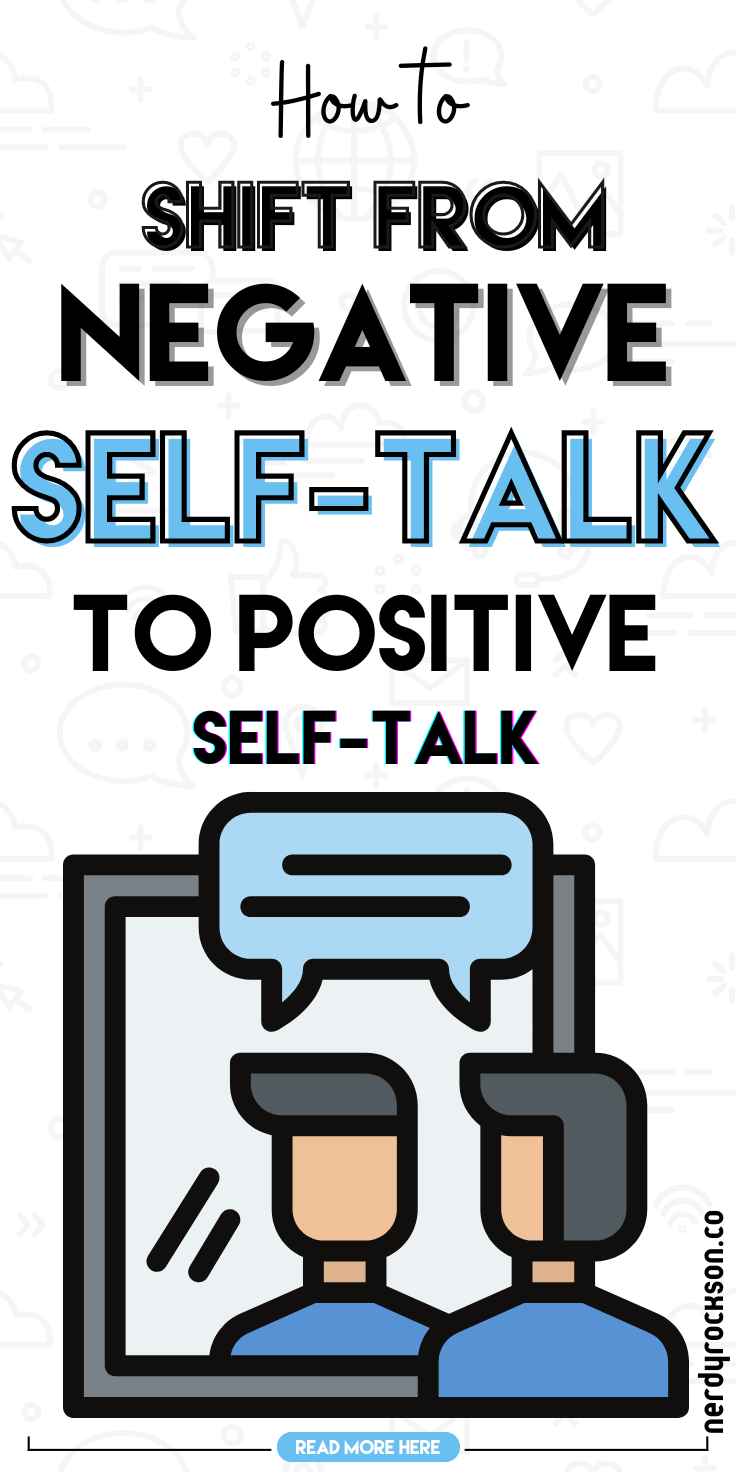Self-care is a comprehensive term that encompasses various activities and practices we engage in, on a personal level, to maintain and enhance our health and well-being. It involves the perfect blend of physical, emotional, and mental care, tailored to our unique needs and lifestyles. Equally important in this self-care equation is positive self-talk, a powerful mental tool that can influence our perception of ourselves and the world around us in profound ways.
The role of positive self-talk in self-care is often overlooked, yet it’s instrumental in shaping our internal dialogue. The narrative we create in our minds has a substantial impact on our confidence, self-esteem, and ultimately, our actions.
Once you replace negative thoughts with positive ones, you’ll start having positive results.
Willie Nelson
Here’s how these two concepts intertwine:
- Reduces Stress: Positive self-talk can help in stress reduction – assisting us in coping with stressful situations effectively.
- Boosts Confidence: Regular practice of positive affirmations enhances self-confidence, thereby uplifting our overall wellness.
- Improves Mental Health: Embracing this habit can alleviate symptoms of mental health disorders like depression and anxiety.
In essence, positive self-talk forms an integral part of a holistic self-care routine.
What is Self-Talk
Picture this: a personal internal conversation or monologue that unfolds inside every thinker’s mind throughout their waking hours. This continuous feedback loop within your psyche is best known as self-talk. Stemming from your subconscious mind, self-talk encompasses your conscious thoughts integrated with deeply entrenched beliefs and biases. It’s like an internal monologue that’s constantly active throughout the day, whispering sweet nothings or, at times, not-so-sweet musings into your inner ear.
Self-talk is often broadly classified into two predominant categories: positive and negative self-talk. Let’s double-click on what these entail.
Positive self-talk is akin to your personal cheerleader, an internal dialogue that enhances your feelings of self-worth, awareness, and optimism. It’s the healthy kind of self-talk that works to improve your mental well-being by channeling powerful feelings of encouragement, motivation, and positivity.
Conversely, negative self-talk can often bear a resemblance to an inner critic. Reflecting on a pessimistic internal conversation, excessive negativity can eat away at your confidence, prevent you from realizing your potential, and trap you in a ruthless cycle of overthinking or rumination. This grim outlook can diminish your overall mental health, casting long, perturbing shadows over your self-concept and perception of the world around you.
In a nutshell, the nature of your self-talk – whether positive, supportive, and encouraging or negative, walls closing in – can hold momentous sway over your overall mental health and your approach to self-care.
The Power of Positive Self-Talk
Cultivating a habit of positive self-talk can indeed have a profound impact on both the mental and physical aspects of your health. When we feed our minds with positive affirmations, we are changing the way our brains function, leading to a more optimistic outlook on life. Moreover, research indicates that positive thinkers have lower rates of depression and distress, greater resistance to the common cold, better psychological and physical well-being, as well as improved cardiovascular health and coping skills during hardships.
Positive self-talk exerts its beneficial effects primarily by helping mitigate stress levels. As highlighted by the Harvard Medical School, an optimistic approach can not only make you feel better about your life but also give your health a boost. You might live longer and be less likely to get heart disease. Optimism seems to protect the heart and circulation — and it’s heartening to learn that an optimistic outlook early in life can predict better health and a lower rate of death during follow-up periods of 15 to 40 years.
The benefits also extend to mental health. Positive self-talk has been shown to reduce symptoms of depression, increase well-being, and even improve therapy outcomes. A study published in the Journal of Positive Psychology found that positive self-talk can be a powerful tool for increasing feelings of self-worth and curtailing negative emotions.
Just remember, the language you use in your thoughts has much more power over your mood and overall well-being than you may have ever imagined. So be gentle with yourself, infuse positivity into your mind, and observe the transformative changes this simple practice can bring about.


Negative Effects of Negative Self-Talk
Negative self-talk acts as a corrosive force that wears down mental health and well-being. It’s akin to an incessant whisper in the ear, repeatedly echoing messages of inadequacy, failure or not being up to the mark. This constant internal criticism not only chips away at your self-esteem, but also magnifies stress, induces anxiety, and can even shepherd you into the clutches of depression.
Imagine, if you will, your mind as a fertile garden. Negative self-talk? That’s the persistent weed that overruns the beautiful blooms and suffocates growth. This unchecked mental dialogue is destructive to the fragile garden of self-worth, tending to amplify perceived flaws and shortcomings instead of encouraging growth or nurturing positivity.
The swift dive of self-esteem, complicated by anxiety and stress, creates a harsh environment where depression can take root. It’s a downward spiral that seizes the reins of our lives, redirecting our focus from possibilities to problems and failures. It makes thriving a struggle, extinguishing vibrant sparks of resilience and hope, replacing them with the somber ashes of defeat and despair.
How to Shift from Negative to Positive Self-Talk
Firstly, it’s crucial to comprehend that altering one’s self-talk from negative to positive is indeed a process. It takes time and patience. The switch doesn’t happen overnight, but with continual practice and determination, one can make significant strides toward a healthier and more affirming mindset. Here are a few practical strategies.
Mindfulness
A fantastic technique to start with is mindfulness – being fully present in the moment without passing judgment. In terms of self-talk, this method enables you to be aware of the thoughts circulating in your mind, including any negative ones. Through mindfulness, you can calmly observe your thoughts and acknowledge them without immediately accepting them as truth.
Developing this awareness helps you identify negative self-talk when it arises. Once identified, you can consciously choose to respond differently. Perhaps you respond with a positive affirmation or reframe the thought more constructively.
Cognitive Restructuring
Another critical tool for switching negative self-talk to positive is cognitive restructuring. This practice involves the recognition and reassessment of unhelpful thought patterns. You recognize your negative thoughts, evaluate their accuracy, and then challenge them.
For instance, if you find yourself thinking, “I can’t do anything right,” pause for a moment and ask yourself if that’s genuinely correct. Upon reflection, you’ll likely find multiple instances where you’ve succeeded or performed well. Challenge the negativity with these counter-examples, adjusting your self-talk to something like, “I have areas to improve, but I also have a history of accomplishments and skills.”
Positive Affirmations
Last but certainly not least, consider incorporating positive affirmations into your routine. Affirmations are statements of positive self-perception and self-belief that can effectively combat and modify negative thoughts. Examples might include, “I am capable,” “I am worthy,” or “I am improving each day.”
Ensure your affirmations are believable, realistic, and applicable to your current state and goals. By repeating these affirmations consistently, you start to internalize them, allowing them to influence your self-perception and, consequently, your self-talk.
Remember, embarking on this journey of transforming your self-talk is a remarkable step towards achieving optimal self-care and cultivating a positive mindset. It may seem challenging at first, but with patience, persistence, and these techniques in your tool kit, you’re set for success.
Role of Positive Self-Talk in Self-Care
If you’re on the path to self-care, here’s a powerful tool you’ve probably overlooked before – positive self-talk. This inner dialogue is pivotal because it affects how you perceive yourself, and in turn, influences your actions towards self-care.
First, let’s clear an essential point: your self-esteem. High self-esteem often equates to a positive self-concept. With positive self-talk, you empower yourself to recognize and acknowledge your worth, capabilities, and achievements. This quiet pat on the back nurtures your self-esteem, edging you further on the path of self-care. After all, when you believe in your worth, you invest more in caring for yourself.
But self-care is more than pampering yourself. It is about fostering resilience, your ability to dust yourself off and rise after taking a hard hit. The brilliant thing about indulging in positive self-talk is that it bolsters your resilience. Each time your Chatterbox whispers, “You’ve got this!” or “You are strong!”, your resilience grows. Therefore, positive self-talk doesn’t just help you face challenges head-on; it also miraculously speeds up your recovery from setbacks.
Lastly, a key asset to self-care is an array of effective coping skills. Your inner chatterbox can be your greatest ally in developing these. By consciously choosing positive self-talk strategies, you can regulate your emotions better, withstand stress, and generally manage life’s curveballs more effectively. Whether it’s voicing positive affirmations to empower you during stressful times, or challenging negative thoughts to keep pessimism at bay, positive self-talk is a cornerstone to developing coping skills integral to great self-care habits.
In essence, positive self-talk holds a colossal presence in self-care. It transforms how you view yourself, escalates your resilience, and muscles up your coping skills. So, spray a positive flavor into your self-talk every day, and watch yourself bloom in the garden of self-care.
Practical Tips for Cultivating a Positive Mindset
Cultivating a positive mindset is not a singular event but a continuous practice. The key is to introduce small, intentional changes regularly into your daily routine. Here are some strategies, tips, and practices to guide you in this journey.
1. Gratitude Journaling
A powerful tool for developing a positive outlook is keeping a gratitude journal. This practice involves writing down things that you are grateful for daily. By consciously shifting your focus to positive aspects of your life, you can effectively reframe your mind to look for the good rather than the negative.
2. Meditation
Meditation gives you the chance to declutter your thoughts and focus on the present. This practice promotes self-awareness and helps decrease anxieties, fostering a more positive outlook on life. If you’ve never tried meditating before, start with just a few minutes a day. There are many resources available such as guided meditations or apps designed to help beginners ease into this practice.
3. Setting Positive Intentions
Setting positive intentions at the start of each day can shape how you approach your day. It’s about creating a mindful roadmap for the day ahead, influencing your behavior, reactions, and mindset. By starting the day on a positive note, you can maintain that energy as you face the day’s challenges.
4. Positive Visualization
Visualization involves harnessing the power of your imagination to visualize specific behaviors or events happening in your life. Take a few quiet moments each day to visualize positive scenes, hear encouraging words, and feel positive emotions. This can serve to alter your mindset and inspire your actions.
5. Surround Yourself With Positive People
Who you interact with can directly impact your outlook on life. Surround yourself with positive, uplifting people who encourage you, believe in you, and infuse positivity into your world. Negative influences, on the other hand, can drain your energy and bring your mood down.
Remember, these practices aren’t about denying difficulties or adopting an unrealistically rosy view of the world. Rather, they are ways to train your mind to handle negative situations more positively, thus improving your overall well-being and impact on the world around you.
Challenges in Practicing Positive Self-Talk
Embracing positive self-care, like any significant change, comes with its fair share of challenges. It’s much easier to fall back into old patterns of negative self-talk and self-blame. But remember this during your journey towards positivity: patience is key. From patience springs consistency, and it’s this consistency that weaves your new habits firmly into your daily life. Let’s take a brief look at common obstacles you might encounter when practicing positive self-talk, and how to effectively overcome them.
- Obstacle: Identifying Negative Self-Talk One common obstacle is recognizing the presence of negative self-talk. More often than not, it’s so deeply ingrained in our consciousness that we overlook it. Solution: Make a conscious effort to jot down negative thoughts as they come up. Being aware of your negative self-talk is the first step in the process of changing it to something more positive.
- Obstacle: Scepticism Towards Positive Self-Talk Many of us are skeptical about the power of positive self-talk. It can seem forced and insincere, especially in the beginning. Solution: Give it time. It might feel strange at first, but over time, positive self-talk becomes more natural. Remember, repetition is key to forming new habits.
- Obstacle: Non-Supportive Environment Being surrounded by people who constantly engage in negative thinking can put a damper on your attempts at maintaining a positive attitude. Solution: Try to communicate your intentions with the people around you. Encourage them to join you in your positive journey. If this isn’t possible, seeking support from like-minded communities can be extremely helpful.
- Obstacle: High-Stress Levels Stress can be a significant hindrance when trying to develop positive self-talk, as it can cloud your ability to practice mindfulness and approach situations with a positive mindset. Solution: Invest in techniques to manage your stress effectively such as regular exercise, meditation, and adequate sleep. They will help maintain a balanced mind, facilitating positive self-talk.
Like every change, moving from negative to positive self-talk is a gradual process. Embrace the journey and remain patient with yourself. Every small effort you make today is an investment in your well-being and healthier mental state for tomorrow.
Conclusion
As we draw to a close, it’s clear that positive self-talk holds a pivotal role in our self-care regimen. It’s not just about uplifting words; it’s a tool that can reframe our worldview, fostering a healthier outlook on the world and ourselves. Remember, the journey towards positive self-talk isn’t a quick fix but a consistent effort. From cultivating mindfulness, and restructuring our thought processes, to creating positive affirmations, each action plays a crucial role.
It’s a path that may have obstacles, and that’s okay. Be patient with yourself. Recognizing negative self-talk, overcoming skepticism, and dealing with non-supportive environments, and high stress levels – these challenges are all part of the journey. But with steady, persistent efforts, a balance between screw-ups, and successes can be achieved.
So what are you waiting for? Jump into this transformative journey towards more positive self-talk. Let’s revamp that inner dialog – your future self will thank you!









